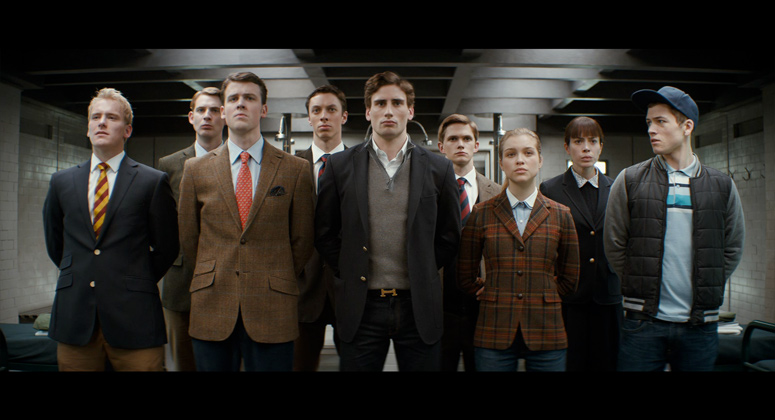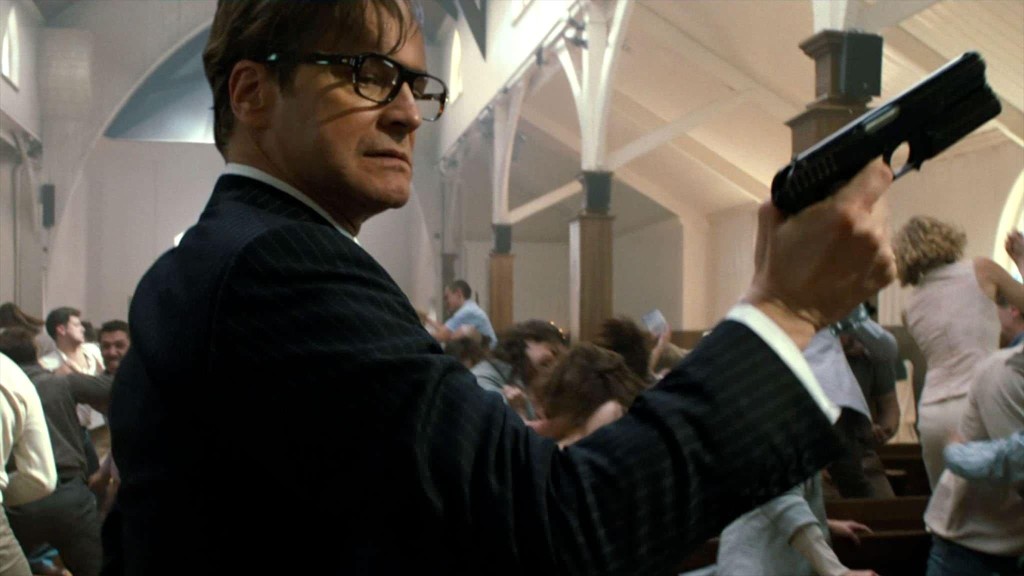Hey guys, sorry for no Amateur Offerings Saturday and the re-post of a Newsletter review today (sign up for the newsletter here). Busy at work putting the Scriptshadow 250 Contest together. So hang tight and discuss all the goodness that directors like Matthew Vaughn bring to the world…
Genre: Action/Spy
Premise: A young British hooligan is recruited into a top secret agency founded on the principles of the Knights of the Round Table.
About: This is Matthew Vaughn’s (Kick-Ass, X-Men: First Class) upcoming film, which he wrote with longtime collaborator Jane Goldman. It’s based on the comic book, “The Secret Service.” Vaughn was offered pretty much every major movie property in town, but the director likes to challenge himself and so avoids working on the same kind of movie twice. That may change with The Secret Service, which is clearly set up to be a major franchise in the vein of James Bond. Rising star Taron Egerton will play the lead role of Eggsy.
Writer: Jane Goldman and Matthew Vaughn (based on the comic book by Dave Gibbons and Mark Millar)
Details: 125 pages – April 2013 draft
If you’re looking to write the next breakout franchise, this is one of the most franchise-friendly formulas you can use. You take a nobody. Have him recruited into a secret organization of some sort. Show him training and getting better. Then have him take on the bad guys. He’ll fail at first, then get stronger, and in the end, he’ll finally defeat the villain. It worked for The Matrix. It worked for Wanted. It worked for Harry Potter. It worked for Remo Williams.
Well, wait. Okay, it didn’t work for Remo Williams. But that wasn’t Remo’s fault. It was Chiun’s fault.
There are so many qualities about this setup that make it work. You have the underdog conceit (everyone loves an underdog), the training (we love watching someone train and get better at something), and the revelatory mythology that goes with all these stories (all the little nooks and crannies of how the organization came to be).
The setup is so ideal for storytelling, in fact, that you wonder why there aren’t more of these films being made! Well, the one trick in getting them right is coming up with a fresh enough take on them. All the examples I used above felt fresh at the time. Except for Remo Williams. So how does The Secret Service fare?
Jack Lincoln – call him our Galahad – starts off the film leading a group of secret agents (with names like Merlin and Lancelot) to take down a nasty terrorist. But once they capture the terrorist, one of Jack’s men, Lee, notices that the terrorist has a bomb. Lee jumps on him as the bomb goes off, and is killed instantly so that the rest of the group can live.
In a token gesture, Jack goes to Lee’s family (his wife and young son) and tells them that if they ever need a get-out-of-jail-free card, to call. 17 years later, Lee’s son, Eggsy, a hooligan who spends most of his days burglarizing cars and drinking pints of Guinness, needs just that. After getting arrested, he calls to get out of a looming prison sentence, and Jack keeps his promise.
But Jack doesn’t stop there. Jack sees a lot of Lee in Eggsy, and invites him into his top secret organization, Huntsman and Sons. The thing is, Huntsman typically only recruits the best of the best, people from the best backgrounds and the best educations. So Eggsy is a bit of an outsider.
But while everyone else is smarter than Eggsy, Eggsy has that street experience that makes him tougher than his fellow private school recruits. And he’s going to need it. There are some nasty little men the Hustman have to take on, such as “Gazelle,” a guy with Olympic running blades for legs (I see they’ve changed this character to a female in the final film), except his blades are razor sharp, allowing him to chop up his prey with a Michael Jackson swish of his knee. Woo-hoo! Jam-mone!
Eventually, a true villain arises in the form of a Mark Zuckerberg’esque tech giant who’s unhealthily obsessed with earth’s well-being. Huntsman and Sons begin to suspect that his next product may give him a little too much control over the people who use it. Therefore, Eggsy and his band of merry men will have to put on their big boy secret agent pants to take down Zuckerberg and save the world.
I really like what Goldman and Vaughn are doing here. It’s smart. They’re bringing back the fun to Bond movies without the baggage of Bond. It allows them to create a less kitchsy version of 007, and play with a lot of the humor that the ultra-serious new films are so devoid of. As a kid, my favorite part of the Bond movies was always the gimmicky weapons introductions, and we get plenty of that here (Jack fights with an umbrella with about 50 different gadgets attached to it).
Connecting the Secret Service to the Knights of the Round Table fable was also a clever idea, although I thought this would’ve been so much cooler had the agency literally still have been the Round Table. That the Knights never went away and this was their modern incarnation. But hey, beggers can’t be choosers.
But The Secret Service does have one major problem. It whiffs with its main character. I’m talking about Eggsy. In every one of the movies I mentioned above, the formula is the same. We get to know our underdog hero’s shitty and/or normal life, before they’re recruited into the super-secret organization.
With The Secret Service, the first act is dedicated almost exclusively to everyone BUT Eggsy (our main character). We get to know Jack. We get to know Jack’s boss, the head of the agency. We get to know our Mark Zuckerberg bad guy. When Eggsy does come around, he’s usually gone before you know it.
I think I understand what Goldman and Vaughn were thinking. They wanted to use that time to sell the agency. And there’s no doubt, it’s a cool freaking agency. But the problem with not establishing your hero early, is that the audience feels lost. They don’t have that character whose hand they can hold onto. They don’t have anyone to lead them through the story. In many ways, the reader in the writer-reader relationship is kind of like a child. They need the reader to show them the way. And that’s hard to do if there isn’t a character who steps up to play the “follow me” part.
Granted, this approach has worked before (there’s a ton going on in Star Wars early on outside of Luke), but just because an unorthodox approach worked in another movie doesn’t mean you can just port it over and expect similar results. Every time Eggsy came around, all I could think was, “I don’t know this guy!” When the other recruits made fun of him, I didn’t have a good enough sense of him to know what they were making fun of him about.
Think of another recent film that did this – Godzilla. Now Godzilla was kind of fun. But they spent the first 20 minutes on two characters (the hero’s mom and dad) who both died! They weren’t even in the rest of the movie. That time could’ve been spent getting to get to know our hero!! And what was one of the biggest complaints about Godzilla? That its main character was the most boring part of the movie. Why? Well, there were a few reasons. But not spending the first 20 minutes of the movie getting to know him certainty didn’t help.
Another thing that happens if you don’t feature your hero early is that, when he finally gets his moment, you’re rushing through it. You’ve lost out on pages and pages of screenplay real estate and now you’re playing catch-up. It can be done. In fact, I think Star Wars does this brilliantly. That one dinner scene with Luke, his aunt and his uncle, conveyed everything we needed to know about Luke (that he had bigger dreams and that he wanted to leave the farm and make a greater impact on the universe). But what I usually see when writers get themselves in this situation is a lot of on-the-nose statements about the character because the lack of time prevents the use of any subtlety.
This can have a catastrophic effect on the script moving forward. Since a reader/audience will rarely care about a story in which they don’t connect with the hero, this false rushed set-up of the hero eliminates any chance of connection. And once an audience makes that choice, they don’t change it. They will feel that way about the character for the rest of the movie.
With that said, The Secret Service is saved by its pure celebration of fun. This is a world where villains with Olympic blades for legs can slice you in half at a moment’s notice. It’s a world where the training exercises include real bullets. It’s a world where people can kill other people with a text message.
We’ve been missing a film like this. Guardians of the Galaxy proves that people are ready to laugh again. I just wish The Secret Service was more than a fun escape. I wish Goldman and Vaughn gave us a lead with more meat. This could’ve easily been a double worth-the-read or an impressive with a great protagonist.
[ ] what the hell did I just read?
[ ] wasn’t for me
[x] worth the read
[ ] impressive
[ ] genius
What I learned: Another great reminder that one of the best ways to approach ideas is to look for a previously established idea and update it. Knights of the Round Table? Let’s set in in the present day. Boom, you have yourself a movie.
What I learned 2: There are two people your characters are talking to during dialogue. They’re talking to the other character in the scene (one) and they’re talking to the reader/viewer (two). If you want to excel in dialogue, make sure your characters are first and foremost talking to each other. The second your characters are talking more to the audience than each other, is the second you’re writing bad dialogue.



